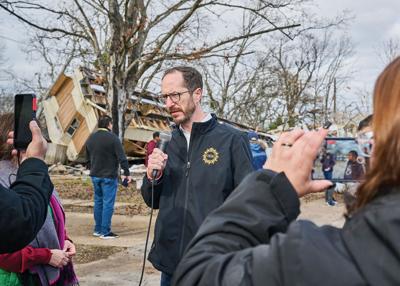Freddie O’Connell claimed victory on a full stage at Eastside Bowl in September. It was a mirror image of his advancing to the mayoral runoff six weeks earlier in the packed Midtown event space Analog at the Hutton Hotel. The room showed off his strength: a multiracial, multiethnic, multilingual, intergenerational appeal that united the worlds of business, nonprofits, activism, neighborhood leadership and Metro boards and commissions, all in one Freddie universe. With slogans like “I want you to stay,” he positioned his campaign as a long shot against the profit-seekers controlling the city, a proxy for gentrification and real estate handouts at the expense of reliable city services. A folksy football ad pitted Freddie against cigar-chomping billionaires. His successful brand of polite populism implied fundamental change to lots of different constituencies.
Now he governs. This year will feature O’Connell’s first capital improvements budget and capital spending plan, the real power of the mayor to determine what projects get funded by the city. John Cooper, O’Connell’s predecessor, left the mayor’s office knee-deep in half-finished business, headlined by a legally binding commitment to support the construction of a new domed stadium for the Tennessee Titans and a bustling neighborhood around it. Other projects like Wharf Park downtown and the Global Mall in Antioch will demand some level of coordination and management from O’Connell’s office. These special projects will likely fall to Cooper holdover Sam Wilcox as well as new hire Bob Mendes. Mendes was previously an O’Connell ally in the council, now brought on as the mayor’s chief development officer — a new senior-level position with a $250,000 annual salary.
O’Connell capped his transition with a memo each on transit, city operations and growth. Most paragraphs were bureaucratic jargon. The operations memo recommended that O’Connell “ensure that every Metro department delivers excellent customer service, and that every Nashvillian can interact with Metro Government in the way that works best for them.” The growth memo urged the mayor to “empower Nashville’s neighborhoods to articulate and advocate for their priorities,” and “identify or create a team or entity that can bring Metro’s plans to reality.” Two specifics stuck out: executing the development of the East Bank (addressed elsewhere in this issue) and pushing a new transit plan early enough for a November referendum vote (also covered in this issue).
In 2024, we will be watching whether and how O’Connell rolls out a citywide transit plan that will equitably, efficiently and comprehensively address the city’s car-centric transportation infrastructure and its scourge of pedestrian and cyclist deaths. This was the main pillar of his campaign’s central promise — before you move away, give me a shot at fixing Nashville’s growing pains — and must vanquish the specter of failure under Megan Barry, whose mass transit plan was shot down by many of the same sorts of neighborhood advocates as in the O’Connell coalition. The mayor draws praise for how comfortably he moves between rooms, and he will have to manage inevitable fractures in this big tent. Tensions have already begun to emerge from the O’Connell administration’s push for new police TASERs, and an equivocal administration response to Israel’s mass killing in Gaza.
From housing and transportation to development of the East Bank, here are 11 stories to keep an eye on this year






